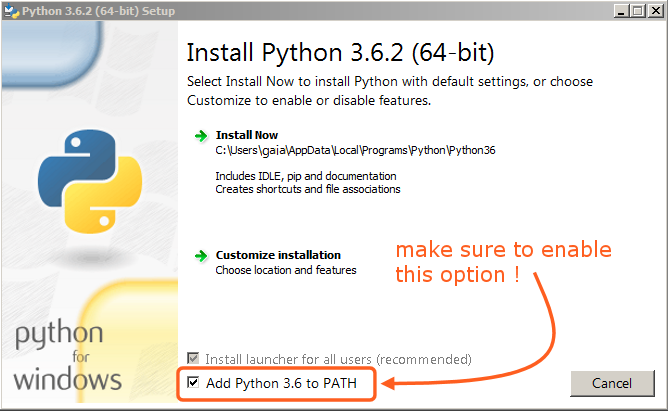Instalação no Windows¶
Este guia aborda os seguintes tópicos:
Instalando o Python (usado para «converter» os arquivos de fonte para HTML)
Instalando o Python¶
Download the Python installation package for Windows. In this guide version 3.9.x is used.
Instale Python com o assistente de instalação. Por favor, certifique-se de habilitar a opção «Add Python to Path» (Adicionar Python para o caminho):

A opção deve ser habilitada de maneira que você possa construir o manual usando o script «make».¶
Todas as outras configurações podem permanecer como definidas por padrão.
Installing Git and Downloading the Repository¶
In this guide, we will use the official Git client, though any Git client will do.
Download and install Git for Windows.
Simply check out the Blender Manual’s repository using:
cd ~ git lfs install git clone https://projects.blender.org/blender/blender-manual.git
The repository will now be downloaded which may take a few minutes depending on your internet connection.
Nota
This process can be completed using a graphical Git client, in that case you will just use the repository address in the URL field provided by your client:
https://projects.blender.org/blender/blender-manual.git
Configurando o ambiente de construção¶
Dica
It is recommended to setup and activate a virtual Python environment where dependencies will be installed:
python3 -m venv .venv
.venv/Scripts/activate
Repeat the .venv/Scripts/activate command to re-activate the virtual environment,
whenever you open a new terminal to build the documentation.
Abra um prompt de comando. (Executar como Administrador)
Enter the
blender-manualfolder which was just added bygit clone:cd C:\blender-manual
Dentro dessa pasta está um arquivo chamado
requirements.txtque contém uma lista de todas as dependências que precisamos. Instale todas as dependências usando o comandopipdo Python:pip install -r requirements.txt
Se tudo correr bem, você deve ver a seguinte mensagem quando terminar:
Successfully installed Jinja2 MarkupSafe Pygments Sphinx docutils sphinx-rtd-theme Cleaning up...
Durante a configuração, alguns avisos podem ser mostrados, mas não se preocupe com eles. Contudo, caso quaisquer erros ocorram, eles podem causar alguns problemas.
Nota
Every now and then you may want to make sure your dependencies are up to date using:
pip install -r requirements.txt --upgrade